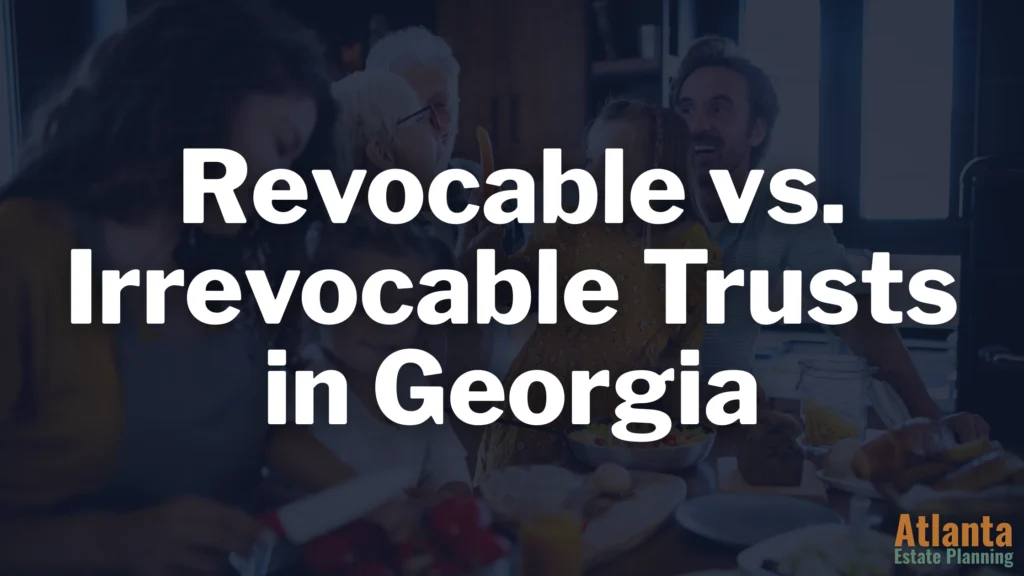What happens to your home, your savings, and your family when you’re gone?
For many families in Georgia, the answer isn’t simple. It’s a drawn-out, expensive court process called probate — one that can freeze your accounts, delay inheritances, and turn private family matters into public records.
It’s painful to watch loved ones struggle just to access what you meant for them to have.
That’s why so many families use a trust. A well-structured trust keeps everything private, avoids court, and makes sure your family can move forward without red tape.
But not all trusts are the same.
In this guide, we’ll walk through the key differences between Revocable vs Irrevocable Trusts in Georgia — so you can decide which one gives your family the best protection and peace of mind.
The Basics: What is a Trust?
Before we compare revocable vs irrevocable trusts, let’s define the main players involved in any trust.
- The Grantor (or Settlor): This is the person who creates the trust and funds it with their assets.
- The Trustee: This is the person—or sometimes a bank—who manages those assets according to the rules in the trust.
- The Beneficiary: This is the person, people, or organization who will receive the benefit from those assets.
Here’s an easy way to picture the two main types of trusts.
- A revocable trust is like a personal safe. You hold the key. You can open it, move things in or out, or change who gets access. You stay in full control.
- An irrevocable trust is like a safe-deposit box at a bank. Once you put assets inside and hand the key to someone else, you can’t open it yourself anymore. It’s permanently secured for your beneficiaries.
That difference—control—is what creates the unique strengths and weaknesses of each type.
Video: Understanding Revocable vs. Irrevocable Trusts in Georgia
Before diving deeper, take a few minutes to watch this overview.
It breaks down the key differences between revocable and irrevocable trusts — and why choosing the right one matters for Georgia families.

Revocable vs Irrevocable Trusts: A Side-by-Side Comparison
Here’s a quick summary of the revocable vs irrevocable trusts. We dig deeper into each option below.
| Feature | Revocable Trust | Irrevocable Trust | ||
|---|---|---|---|---|
| Can it be changed? | Yes. You can amend or revoke it anytime. | No. Once created, it’s generally permanent. | ||
| Avoids Probate? | Yes. Assets pass directly to your beneficiaries. | Yes. Assets also bypass probate. | ||
| Protects from Creditors? | No. Assets are still exposed. | Yes. Strong protection from future creditors. | ||
| Reduces Estate Taxes? | No. Assets stay part of your taxable estate. | Yes. Assets are removed from your taxable estate. | ||
| Helps with Medicaid? | No. Assets are countable. | Yes. Helps protect savings for long-term care. | ||
| Grantor Control | Full control—you can act as your own trustee. | No control—you give up ownership and management rights. | ||
| Privacy | High. Avoids the public record of probate. | High. Administration stays private. | ||
The Revocable Living Trust: The Foundation of Flexibility
Most Georgia families start here.
A revocable living trust gives you maximum flexibility and control while you’re alive.
You can add or remove assets, change who inherits them, or even dissolve the trust entirely. Nothing about your daily life changes—you still manage everything as usual.
For a deeper look, you can read our overview of Revocable Trusts.
Key Benefits of a Revocable Trust
Avoids Probate Entirely.
When you pass away, any asset titled in your trust’s name transfers directly to your beneficiaries. There’s no court process, no public record, and no delay. It’s private, fast, and far less stressful for your family.
Smooth Management if You Become Incapacitated.
If illness or injury keeps you from handling your finances, your successor trustee can step in immediately. They can pay your bills, manage your accounts, and keep things running—without court involvement.
Complete Control.
You stay in charge. You can serve as your own trustee, make changes anytime, and use your assets just as before.
The Limitations of a Revocable Trust
Because you keep full control, the law still treats those assets as yours.
- No Asset Protection. Creditors, lawsuits, or divorce can reach what’s inside your revocable trust.
- No Tax Advantage. The IRS still includes those assets in your taxable estate.
- Countable for Medicaid. If you apply for long-term care assistance, those assets count against you. Medicaid sees them as available for your use.
The Irrevocable Trust: The Fortress of Protection
An irrevocable trust is different—it’s permanent.
When you transfer assets into it, you legally give up ownership and control. That finality is what gives it power.
Key Benefits of an Irrevocable Trust
Strong Asset Protection.
Because you no longer own the assets, they’re generally shielded from future creditors, judgments, and lawsuits. This is why doctors, business owners, and others in high-liability fields often use them.
Estate Tax Reduction.
When assets leave your estate—and any future growth on them leaves as well—you may reduce or even eliminate estate taxes for your heirs.
Medicaid and Long-Term Care Planning.
This is one of the most valuable uses of an irrevocable trust. It lets you protect savings while still qualifying for needs-based benefits such as Medicaid. To be effective, the transfer must happen at least five years before you apply for benefits. (That’s called the five-year look-back period.)
The Trade-Offs of an Irrevocable Trust
- Loss of Control: Once the trust is signed and funded, you can’t simply take your assets back.
- Complexity and Cost: An irrevocable trust requires more legal drafting and sometimes its own tax filings.
Handling Special Assets: Real Estate and Businesses in Your Georgia Trust
For many Georgians, the biggest assets aren’t just cash—they’re homes and small businesses. Let’s look at how revocable vs irrevocable trusts handle both.
Trusts and Your Georgia Home
1. Mortgages.
Most mortgages have a “due-on-sale” clause that lets the lender demand full repayment when ownership changes.
Thankfully, a federal law—the Garn-St Germain Act of 1982—protects homeowners who move property into their revocable living trust, as long as they remain a beneficiary.
That protection doesn’t automatically extend to irrevocable trusts, so you’ll want to check with your lender first.
2. Homeowner’s Insurance.
This is an often-missed detail. Once your home is in a trust, your personal insurance policy may no longer cover it.
Call your insurance agent right away and have the trust added as an “additional insured.” That ensures your coverage stays intact.
Trusts and Your Business (LLC)
If you own an LLC, placing your membership interest into a trust is vital. Otherwise, your company can get stuck in probate.
But first, review your Operating Agreement—it controls how ownership transfers.
If that document restricts or forbids transfers, you must follow its terms exactly. Failing to do so could make the transfer invalid.
Your estate plan and your business documents need to work together.
Frequently Asked Questions About Georgia Trusts
Do I need a trust if I have a will?
A will doesn’t avoid probate. It only gives the court instructions. A trust owns your assets directly, so no judge is involved. Most complete estate plans include both.
How much does it cost to set up a trust?
A revocable trust usually costs more than a simple will, but far less than your family would pay in probate fees later. Think of it as paying a little now to save a lot later.
Making the Right Choice for Your Family
Choosing between revocable vs irrevocable trusts depends on your goals.
Pick a revocable trust if you want to:
- Avoid probate.
- Plan for incapacity.
- Keep total control over your assets.
Pick an irrevocable trust if you want to:
- Protect assets from lawsuits or creditors.
- Reduce estate taxes.
- Plan ahead for nursing-home or long-term care costs.
This isn’t a one-size-fits-all decision. The details of Georgia law—and federal tax law—make every situation unique.
Schedule a Consultation with Our Georgia Trust Attorneys
Protecting your legacy is too important to leave to chance.
Our experienced Atlanta estate planning attorneys help families across Georgia build trusts that truly work—clear, private, and customized for your goals.
Contact us today to schedule a consultation and find out which trust structure will best secure your family’s future.

